Analysis of Sustainable and Responsible Tourism Management in Iceland
VerifiedAdded on 2022/12/29
|22
|6914
|470
Report
AI Summary
This report provides a comprehensive analysis of sustainable and responsible tourism management, focusing on the case of Iceland. It begins with an explanation of the evolution of sustainable tourism, highlighting the roles and missions of leading global organizations like UNWTO and WTTC in promoting responsible practices. The report then explores tourism development and planning, emphasizing strategies to minimize adverse effects and evaluating challenges. It examines the socio-cultural, economic, and environmental impacts of the tourism industry, along with the principles of sustainable tourism. The contribution of different stakeholders and the importance of stakeholder engagement are also discussed. Finally, the report analyzes the development and management of sustainability in different tourist destinations, offering recommendations for improving sustainable management practices worldwide. The report covers topics like the evolution of sustainable tourism, the role of global organizations, tourism development and planning, impact analysis, stakeholder engagement, and the development and management of sustainability in different tourist destinations. The document explores the relevance and application of sustainable and responsible tourism concepts, the purpose and principles of tourism development, and the critical evaluation of different approaches to tourism development and planning. It emphasizes the value and importance of stakeholder engagement and partnerships in minimizing adverse impacts and meeting overall sustainable objectives. The report also includes justified recommendations and solutions for improving sustainable management and development for a range of tourist destinations worldwide.

Sustainable and
Responsible Tourism
Management
Responsible Tourism
Management
Paraphrase This Document
Need a fresh take? Get an instant paraphrase of this document with our AI Paraphraser
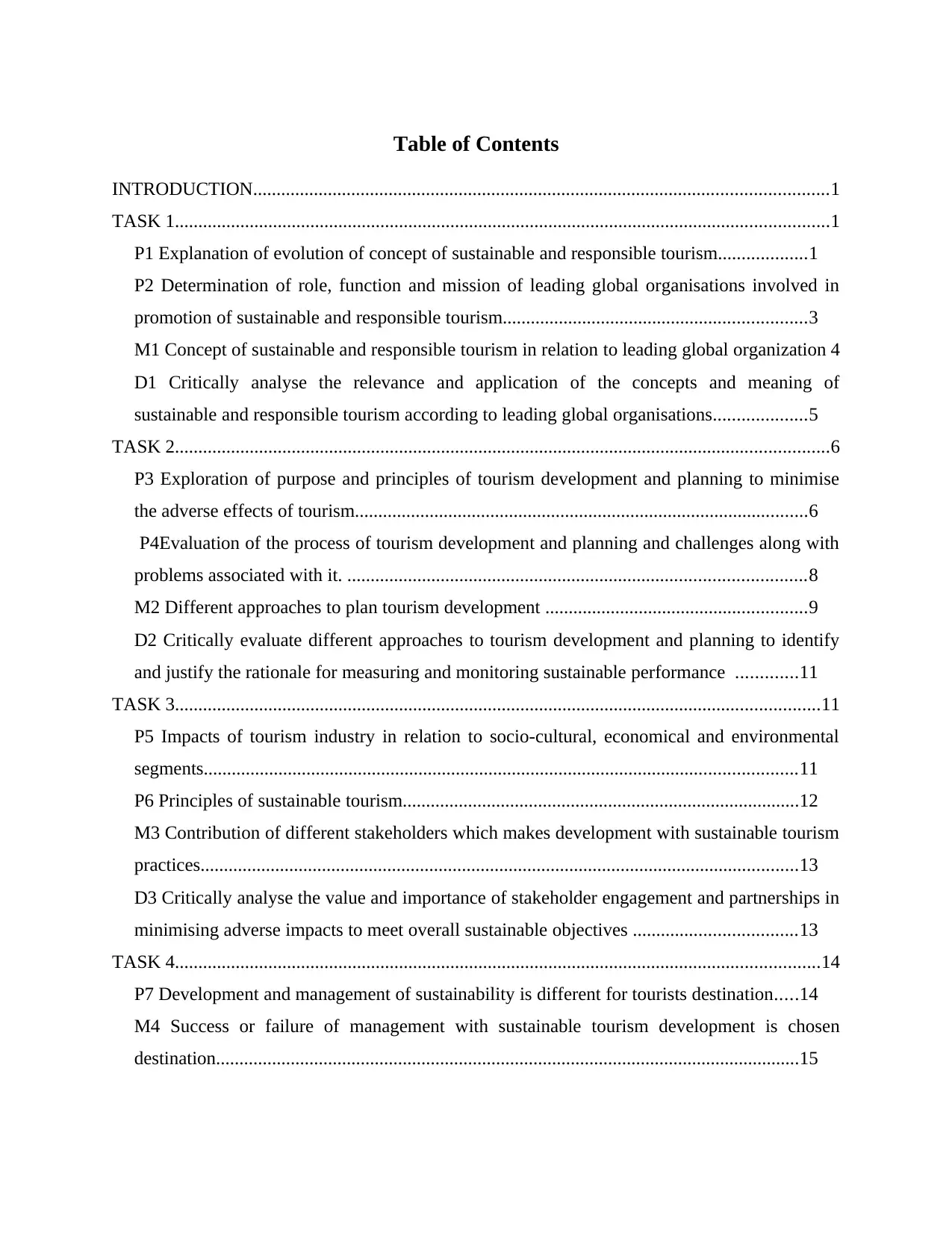
Table of Contents
INTRODUCTION...........................................................................................................................1
TASK 1............................................................................................................................................1
P1 Explanation of evolution of concept of sustainable and responsible tourism...................1
P2 Determination of role, function and mission of leading global organisations involved in
promotion of sustainable and responsible tourism.................................................................3
M1 Concept of sustainable and responsible tourism in relation to leading global organization 4
D1 Critically analyse the relevance and application of the concepts and meaning of
sustainable and responsible tourism according to leading global organisations....................5
TASK 2............................................................................................................................................6
P3 Exploration of purpose and principles of tourism development and planning to minimise
the adverse effects of tourism.................................................................................................6
P4Evaluation of the process of tourism development and planning and challenges along with
problems associated with it. ..................................................................................................8
M2 Different approaches to plan tourism development ........................................................9
D2 Critically evaluate different approaches to tourism development and planning to identify
and justify the rationale for measuring and monitoring sustainable performance .............11
TASK 3..........................................................................................................................................11
P5 Impacts of tourism industry in relation to socio-cultural, economical and environmental
segments...............................................................................................................................11
P6 Principles of sustainable tourism.....................................................................................12
M3 Contribution of different stakeholders which makes development with sustainable tourism
practices................................................................................................................................13
D3 Critically analyse the value and importance of stakeholder engagement and partnerships in
minimising adverse impacts to meet overall sustainable objectives ...................................13
TASK 4..........................................................................................................................................14
P7 Development and management of sustainability is different for tourists destination.....14
M4 Success or failure of management with sustainable tourism development is chosen
destination.............................................................................................................................15
INTRODUCTION...........................................................................................................................1
TASK 1............................................................................................................................................1
P1 Explanation of evolution of concept of sustainable and responsible tourism...................1
P2 Determination of role, function and mission of leading global organisations involved in
promotion of sustainable and responsible tourism.................................................................3
M1 Concept of sustainable and responsible tourism in relation to leading global organization 4
D1 Critically analyse the relevance and application of the concepts and meaning of
sustainable and responsible tourism according to leading global organisations....................5
TASK 2............................................................................................................................................6
P3 Exploration of purpose and principles of tourism development and planning to minimise
the adverse effects of tourism.................................................................................................6
P4Evaluation of the process of tourism development and planning and challenges along with
problems associated with it. ..................................................................................................8
M2 Different approaches to plan tourism development ........................................................9
D2 Critically evaluate different approaches to tourism development and planning to identify
and justify the rationale for measuring and monitoring sustainable performance .............11
TASK 3..........................................................................................................................................11
P5 Impacts of tourism industry in relation to socio-cultural, economical and environmental
segments...............................................................................................................................11
P6 Principles of sustainable tourism.....................................................................................12
M3 Contribution of different stakeholders which makes development with sustainable tourism
practices................................................................................................................................13
D3 Critically analyse the value and importance of stakeholder engagement and partnerships in
minimising adverse impacts to meet overall sustainable objectives ...................................13
TASK 4..........................................................................................................................................14
P7 Development and management of sustainability is different for tourists destination.....14
M4 Success or failure of management with sustainable tourism development is chosen
destination.............................................................................................................................15
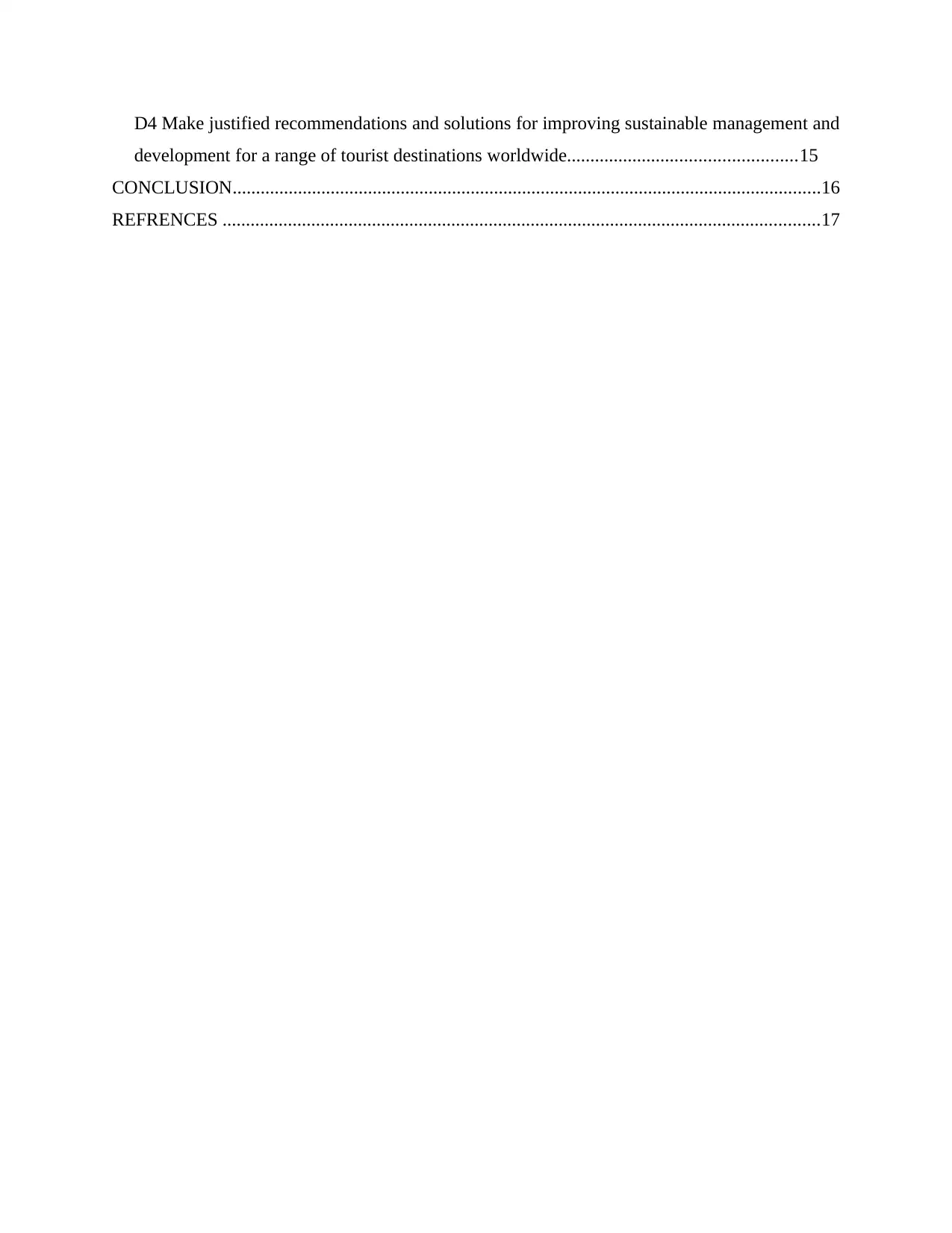
D4 Make justified recommendations and solutions for improving sustainable management and
development for a range of tourist destinations worldwide.................................................15
CONCLUSION..............................................................................................................................16
REFRENCES ................................................................................................................................17
development for a range of tourist destinations worldwide.................................................15
CONCLUSION..............................................................................................................................16
REFRENCES ................................................................................................................................17
⊘ This is a preview!⊘
Do you want full access?
Subscribe today to unlock all pages.

Trusted by 1+ million students worldwide
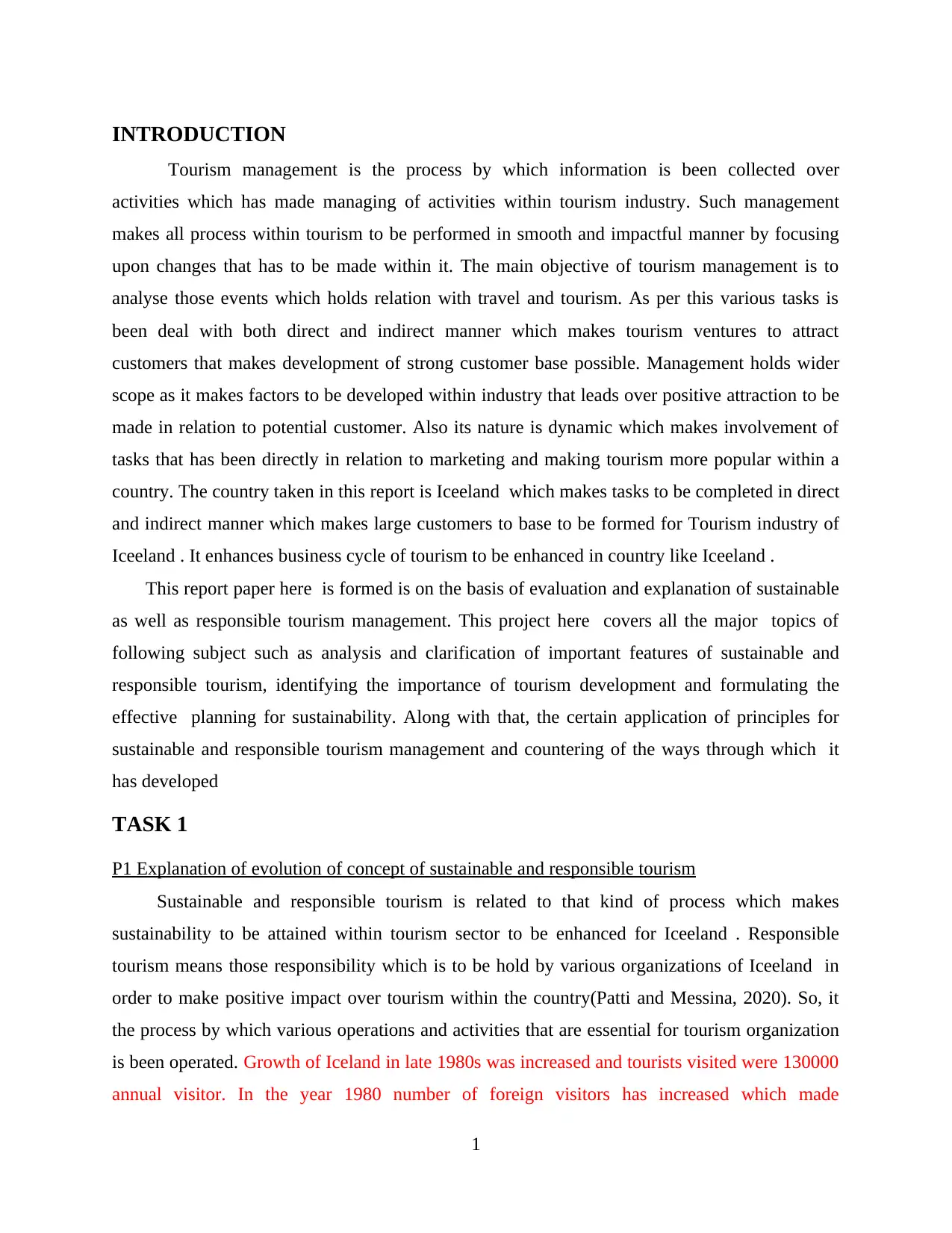
INTRODUCTION
Tourism management is the process by which information is been collected over
activities which has made managing of activities within tourism industry. Such management
makes all process within tourism to be performed in smooth and impactful manner by focusing
upon changes that has to be made within it. The main objective of tourism management is to
analyse those events which holds relation with travel and tourism. As per this various tasks is
been deal with both direct and indirect manner which makes tourism ventures to attract
customers that makes development of strong customer base possible. Management holds wider
scope as it makes factors to be developed within industry that leads over positive attraction to be
made in relation to potential customer. Also its nature is dynamic which makes involvement of
tasks that has been directly in relation to marketing and making tourism more popular within a
country. The country taken in this report is Iceeland which makes tasks to be completed in direct
and indirect manner which makes large customers to base to be formed for Tourism industry of
Iceeland . It enhances business cycle of tourism to be enhanced in country like Iceeland .
This report paper here is formed is on the basis of evaluation and explanation of sustainable
as well as responsible tourism management. This project here covers all the major topics of
following subject such as analysis and clarification of important features of sustainable and
responsible tourism, identifying the importance of tourism development and formulating the
effective planning for sustainability. Along with that, the certain application of principles for
sustainable and responsible tourism management and countering of the ways through which it
has developed
TASK 1
P1 Explanation of evolution of concept of sustainable and responsible tourism
Sustainable and responsible tourism is related to that kind of process which makes
sustainability to be attained within tourism sector to be enhanced for Iceeland . Responsible
tourism means those responsibility which is to be hold by various organizations of Iceeland in
order to make positive impact over tourism within the country(Patti and Messina, 2020). So, it
the process by which various operations and activities that are essential for tourism organization
is been operated. Growth of Iceland in late 1980s was increased and tourists visited were 130000
annual visitor. In the year 1980 number of foreign visitors has increased which made
1
Tourism management is the process by which information is been collected over
activities which has made managing of activities within tourism industry. Such management
makes all process within tourism to be performed in smooth and impactful manner by focusing
upon changes that has to be made within it. The main objective of tourism management is to
analyse those events which holds relation with travel and tourism. As per this various tasks is
been deal with both direct and indirect manner which makes tourism ventures to attract
customers that makes development of strong customer base possible. Management holds wider
scope as it makes factors to be developed within industry that leads over positive attraction to be
made in relation to potential customer. Also its nature is dynamic which makes involvement of
tasks that has been directly in relation to marketing and making tourism more popular within a
country. The country taken in this report is Iceeland which makes tasks to be completed in direct
and indirect manner which makes large customers to base to be formed for Tourism industry of
Iceeland . It enhances business cycle of tourism to be enhanced in country like Iceeland .
This report paper here is formed is on the basis of evaluation and explanation of sustainable
as well as responsible tourism management. This project here covers all the major topics of
following subject such as analysis and clarification of important features of sustainable and
responsible tourism, identifying the importance of tourism development and formulating the
effective planning for sustainability. Along with that, the certain application of principles for
sustainable and responsible tourism management and countering of the ways through which it
has developed
TASK 1
P1 Explanation of evolution of concept of sustainable and responsible tourism
Sustainable and responsible tourism is related to that kind of process which makes
sustainability to be attained within tourism sector to be enhanced for Iceeland . Responsible
tourism means those responsibility which is to be hold by various organizations of Iceeland in
order to make positive impact over tourism within the country(Patti and Messina, 2020). So, it
the process by which various operations and activities that are essential for tourism organization
is been operated. Growth of Iceland in late 1980s was increased and tourists visited were 130000
annual visitor. In the year 1980 number of foreign visitors has increased which made
1
Paraphrase This Document
Need a fresh take? Get an instant paraphrase of this document with our AI Paraphraser
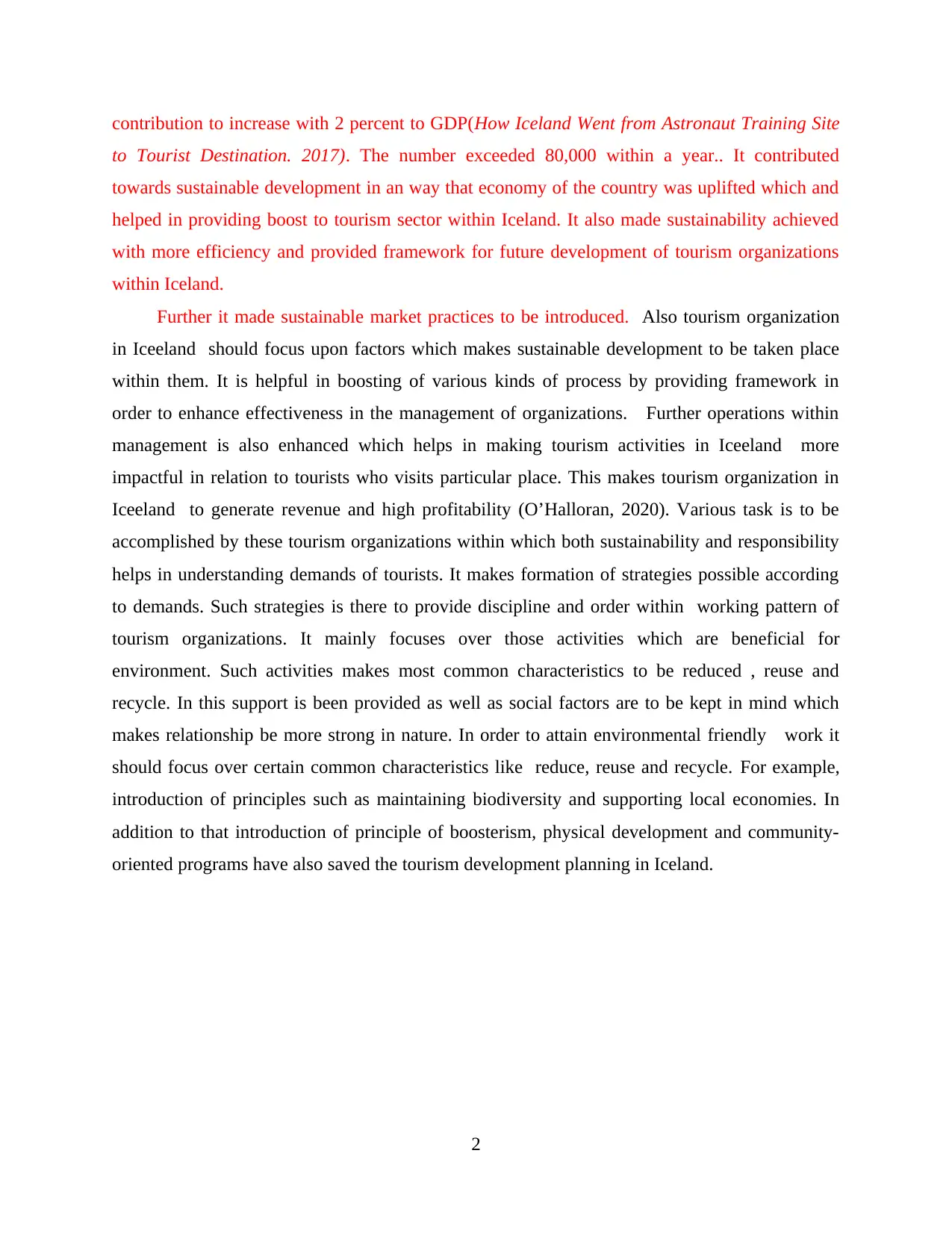
contribution to increase with 2 percent to GDP(How Iceland Went from Astronaut Training Site
to Tourist Destination. 2017). The number exceeded 80,000 within a year.. It contributed
towards sustainable development in an way that economy of the country was uplifted which and
helped in providing boost to tourism sector within Iceland. It also made sustainability achieved
with more efficiency and provided framework for future development of tourism organizations
within Iceland.
Further it made sustainable market practices to be introduced. Also tourism organization
in Iceeland should focus upon factors which makes sustainable development to be taken place
within them. It is helpful in boosting of various kinds of process by providing framework in
order to enhance effectiveness in the management of organizations. Further operations within
management is also enhanced which helps in making tourism activities in Iceeland more
impactful in relation to tourists who visits particular place. This makes tourism organization in
Iceeland to generate revenue and high profitability (O’Halloran, 2020). Various task is to be
accomplished by these tourism organizations within which both sustainability and responsibility
helps in understanding demands of tourists. It makes formation of strategies possible according
to demands. Such strategies is there to provide discipline and order within working pattern of
tourism organizations. It mainly focuses over those activities which are beneficial for
environment. Such activities makes most common characteristics to be reduced , reuse and
recycle. In this support is been provided as well as social factors are to be kept in mind which
makes relationship be more strong in nature. In order to attain environmental friendly work it
should focus over certain common characteristics like reduce, reuse and recycle. For example,
introduction of principles such as maintaining biodiversity and supporting local economies. In
addition to that introduction of principle of boosterism, physical development and community-
oriented programs have also saved the tourism development planning in Iceland.
2
to Tourist Destination. 2017). The number exceeded 80,000 within a year.. It contributed
towards sustainable development in an way that economy of the country was uplifted which and
helped in providing boost to tourism sector within Iceland. It also made sustainability achieved
with more efficiency and provided framework for future development of tourism organizations
within Iceland.
Further it made sustainable market practices to be introduced. Also tourism organization
in Iceeland should focus upon factors which makes sustainable development to be taken place
within them. It is helpful in boosting of various kinds of process by providing framework in
order to enhance effectiveness in the management of organizations. Further operations within
management is also enhanced which helps in making tourism activities in Iceeland more
impactful in relation to tourists who visits particular place. This makes tourism organization in
Iceeland to generate revenue and high profitability (O’Halloran, 2020). Various task is to be
accomplished by these tourism organizations within which both sustainability and responsibility
helps in understanding demands of tourists. It makes formation of strategies possible according
to demands. Such strategies is there to provide discipline and order within working pattern of
tourism organizations. It mainly focuses over those activities which are beneficial for
environment. Such activities makes most common characteristics to be reduced , reuse and
recycle. In this support is been provided as well as social factors are to be kept in mind which
makes relationship be more strong in nature. In order to attain environmental friendly work it
should focus over certain common characteristics like reduce, reuse and recycle. For example,
introduction of principles such as maintaining biodiversity and supporting local economies. In
addition to that introduction of principle of boosterism, physical development and community-
oriented programs have also saved the tourism development planning in Iceland.
2
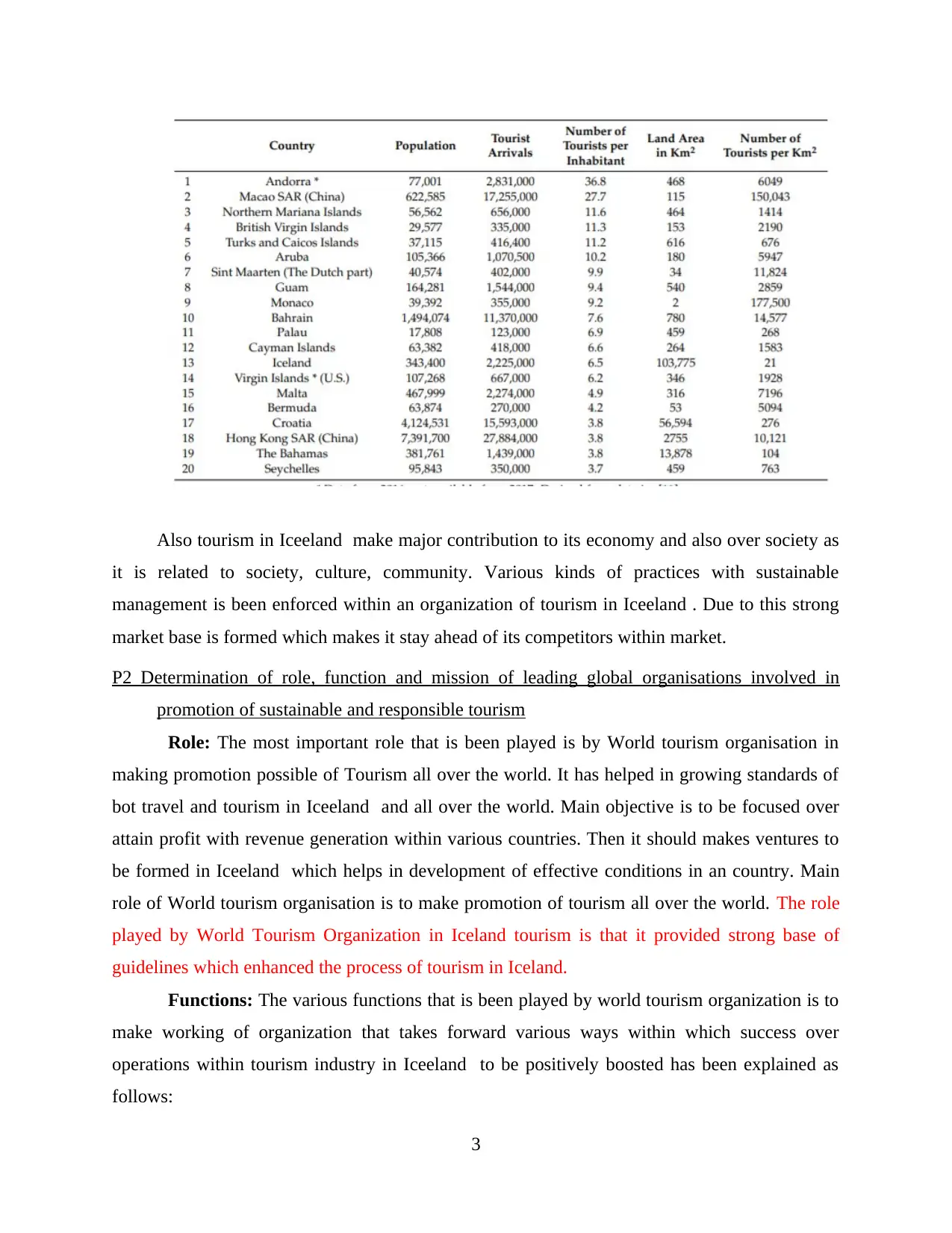
Also tourism in Iceeland make major contribution to its economy and also over society as
it is related to society, culture, community. Various kinds of practices with sustainable
management is been enforced within an organization of tourism in Iceeland . Due to this strong
market base is formed which makes it stay ahead of its competitors within market.
P2 Determination of role, function and mission of leading global organisations involved in
promotion of sustainable and responsible tourism
Role: The most important role that is been played is by World tourism organisation in
making promotion possible of Tourism all over the world. It has helped in growing standards of
bot travel and tourism in Iceeland and all over the world. Main objective is to be focused over
attain profit with revenue generation within various countries. Then it should makes ventures to
be formed in Iceeland which helps in development of effective conditions in an country. Main
role of World tourism organisation is to make promotion of tourism all over the world. The role
played by World Tourism Organization in Iceland tourism is that it provided strong base of
guidelines which enhanced the process of tourism in Iceland.
Functions: The various functions that is been played by world tourism organization is to
make working of organization that takes forward various ways within which success over
operations within tourism industry in Iceeland to be positively boosted has been explained as
follows:
3
it is related to society, culture, community. Various kinds of practices with sustainable
management is been enforced within an organization of tourism in Iceeland . Due to this strong
market base is formed which makes it stay ahead of its competitors within market.
P2 Determination of role, function and mission of leading global organisations involved in
promotion of sustainable and responsible tourism
Role: The most important role that is been played is by World tourism organisation in
making promotion possible of Tourism all over the world. It has helped in growing standards of
bot travel and tourism in Iceeland and all over the world. Main objective is to be focused over
attain profit with revenue generation within various countries. Then it should makes ventures to
be formed in Iceeland which helps in development of effective conditions in an country. Main
role of World tourism organisation is to make promotion of tourism all over the world. The role
played by World Tourism Organization in Iceland tourism is that it provided strong base of
guidelines which enhanced the process of tourism in Iceland.
Functions: The various functions that is been played by world tourism organization is to
make working of organization that takes forward various ways within which success over
operations within tourism industry in Iceeland to be positively boosted has been explained as
follows:
3
⊘ This is a preview!⊘
Do you want full access?
Subscribe today to unlock all pages.

Trusted by 1+ million students worldwide

It has made promotion of travel and tourism to be done within respect of various
segments that has made achievement of economical standards possible within Iceeland.
Enhancing within care and restoration in its various levels should make spot and heritage
places. This makes chances with attraction of lot of tourists possible and also makes firms
to generate opportunities which makes tourists across the world to get attracted to famous
destination in Iceeland.
Also major function is to make sure that appropriate cause of action is to be considered
with the help of sustainability within business environment of tourism to be developed.
Enabling the tourism sector of Iceeland to make changes possible with all kinds of
technologies in making current operations to be formed. It has been making attempts for
providing various information through knowledge upon tourists spots. Also management
of the places should be done for making effectiveness to be performed with various
functions and makes updating of latest trends and costumer to be developed within the
Iceeland 's tourism (Musavengane, 2019).
Funding criteria was also changed which has made Tourism of Iceland improvise in its
various process and made travelling easy with effectiveness.
The above description of various functions within business of tourism and making
understanding develop for World Tourism Organization. It has helped in making Iceland tourism
to be promoted all over the world. Then it has helped in making achieving of standards with
various aspects to be managed with sustainability developed. Thus the function of the
organisation can be termed as the continuous growth tool and activities of the firm
Mission: The mission of World Trade Organization is to make sustainability within
qualities and nature of business to be uplifted within the country like Iceland. The main goal is to
make business to be developed for reaching in top positions in tourism industry with services and
product offered worldwide. It jointly with the help of Iceland government achieve upon demands
of tourism and there needs.
M1 Concept of sustainable and responsible tourism in relation to leading global organization
Leading organizations like UNWTO and WTTC has been using different tools,
techniques and guidelines for protecting of environment and impact upon tourism in Iceland.
Such organization has been working all over the globe. These organizations are responsible for
many legislations around which the course of action followed in the sector depends upon. These
4
segments that has made achievement of economical standards possible within Iceeland.
Enhancing within care and restoration in its various levels should make spot and heritage
places. This makes chances with attraction of lot of tourists possible and also makes firms
to generate opportunities which makes tourists across the world to get attracted to famous
destination in Iceeland.
Also major function is to make sure that appropriate cause of action is to be considered
with the help of sustainability within business environment of tourism to be developed.
Enabling the tourism sector of Iceeland to make changes possible with all kinds of
technologies in making current operations to be formed. It has been making attempts for
providing various information through knowledge upon tourists spots. Also management
of the places should be done for making effectiveness to be performed with various
functions and makes updating of latest trends and costumer to be developed within the
Iceeland 's tourism (Musavengane, 2019).
Funding criteria was also changed which has made Tourism of Iceland improvise in its
various process and made travelling easy with effectiveness.
The above description of various functions within business of tourism and making
understanding develop for World Tourism Organization. It has helped in making Iceland tourism
to be promoted all over the world. Then it has helped in making achieving of standards with
various aspects to be managed with sustainability developed. Thus the function of the
organisation can be termed as the continuous growth tool and activities of the firm
Mission: The mission of World Trade Organization is to make sustainability within
qualities and nature of business to be uplifted within the country like Iceland. The main goal is to
make business to be developed for reaching in top positions in tourism industry with services and
product offered worldwide. It jointly with the help of Iceland government achieve upon demands
of tourism and there needs.
M1 Concept of sustainable and responsible tourism in relation to leading global organization
Leading organizations like UNWTO and WTTC has been using different tools,
techniques and guidelines for protecting of environment and impact upon tourism in Iceland.
Such organization has been working all over the globe. These organizations are responsible for
many legislations around which the course of action followed in the sector depends upon. These
4
Paraphrase This Document
Need a fresh take? Get an instant paraphrase of this document with our AI Paraphraser

organizations constantly step up and conduct events like seminars and public conventions where
stakeholders from all over the globe come together and reflect on their ideas associated with
sustainability in the sector. WTO has made development of concept within tourism in Iceland.
This makes management to be developed by fulfilling of maintaining of culture integrity,
essential ecological process, biological diversity and life support system. Organizations at global
level makes reduction of negative affect upon social and aesthetic needs and making fulfilling
which helps in maintaining integrity through responsibility been developed within economic and
environmental aspect of tourism sector. It contributes towards high economic value to be attained
by tourism within Iceland. Furthermore, often these organizations invest in tourism market which
are not that much developed and fetch investment and infrastructure in the market. In case of
Iceland, it was foreign tourist industry that saw the opportunity and established the outline for
tourism in the market. This helped the local organizations in their growth as well. These
organizations fulfilled their duties of establishing the importance of sustainable practices in local
tourism organization as well.
D1 Critically analyse the relevance and application of the concepts and meaning of sustainable
and responsible tourism according to leading global organisations
According to(George, 2017)Sustainable and responsible tourism development is that kind
of process which helps in keeping account of future economic, social and environmental impact
by understanding needs of tourism industry and host country. Such tourism has helped in
uplifting of tourism in Iceland. UNWTO has made various kinds of arrangements and has used
latest technology to make destinations to be cleaner and attractive. Since tourism in Iceland has
been developing itself within the year 1980s. From 1980 to present time, WTTC and UNWTO
has made major contributions towards the upliftment of tourism in Iceland. They made various
kinds of strategies like introduction of biometrics which makes them keep record of number of
tourists visiting per day. Further the concept of reduce, reuse and recycle introduced which
helped them in attaining environmental objectives. Both these techniques and when applied by
management helped in achieving sustainability by attracting more and more customers. Also
UNWTO has made certain measures compulsory which has helped in enhancing sustainable
development in Iceland and they are as follows:
Social - A business is just an extension of society’s acceptance in the marketplace they
operate within. UNWTO hand and development of search operation cause of action that does not
5
stakeholders from all over the globe come together and reflect on their ideas associated with
sustainability in the sector. WTO has made development of concept within tourism in Iceland.
This makes management to be developed by fulfilling of maintaining of culture integrity,
essential ecological process, biological diversity and life support system. Organizations at global
level makes reduction of negative affect upon social and aesthetic needs and making fulfilling
which helps in maintaining integrity through responsibility been developed within economic and
environmental aspect of tourism sector. It contributes towards high economic value to be attained
by tourism within Iceland. Furthermore, often these organizations invest in tourism market which
are not that much developed and fetch investment and infrastructure in the market. In case of
Iceland, it was foreign tourist industry that saw the opportunity and established the outline for
tourism in the market. This helped the local organizations in their growth as well. These
organizations fulfilled their duties of establishing the importance of sustainable practices in local
tourism organization as well.
D1 Critically analyse the relevance and application of the concepts and meaning of sustainable
and responsible tourism according to leading global organisations
According to(George, 2017)Sustainable and responsible tourism development is that kind
of process which helps in keeping account of future economic, social and environmental impact
by understanding needs of tourism industry and host country. Such tourism has helped in
uplifting of tourism in Iceland. UNWTO has made various kinds of arrangements and has used
latest technology to make destinations to be cleaner and attractive. Since tourism in Iceland has
been developing itself within the year 1980s. From 1980 to present time, WTTC and UNWTO
has made major contributions towards the upliftment of tourism in Iceland. They made various
kinds of strategies like introduction of biometrics which makes them keep record of number of
tourists visiting per day. Further the concept of reduce, reuse and recycle introduced which
helped them in attaining environmental objectives. Both these techniques and when applied by
management helped in achieving sustainability by attracting more and more customers. Also
UNWTO has made certain measures compulsory which has helped in enhancing sustainable
development in Iceland and they are as follows:
Social - A business is just an extension of society’s acceptance in the marketplace they
operate within. UNWTO hand and development of search operation cause of action that does not
5
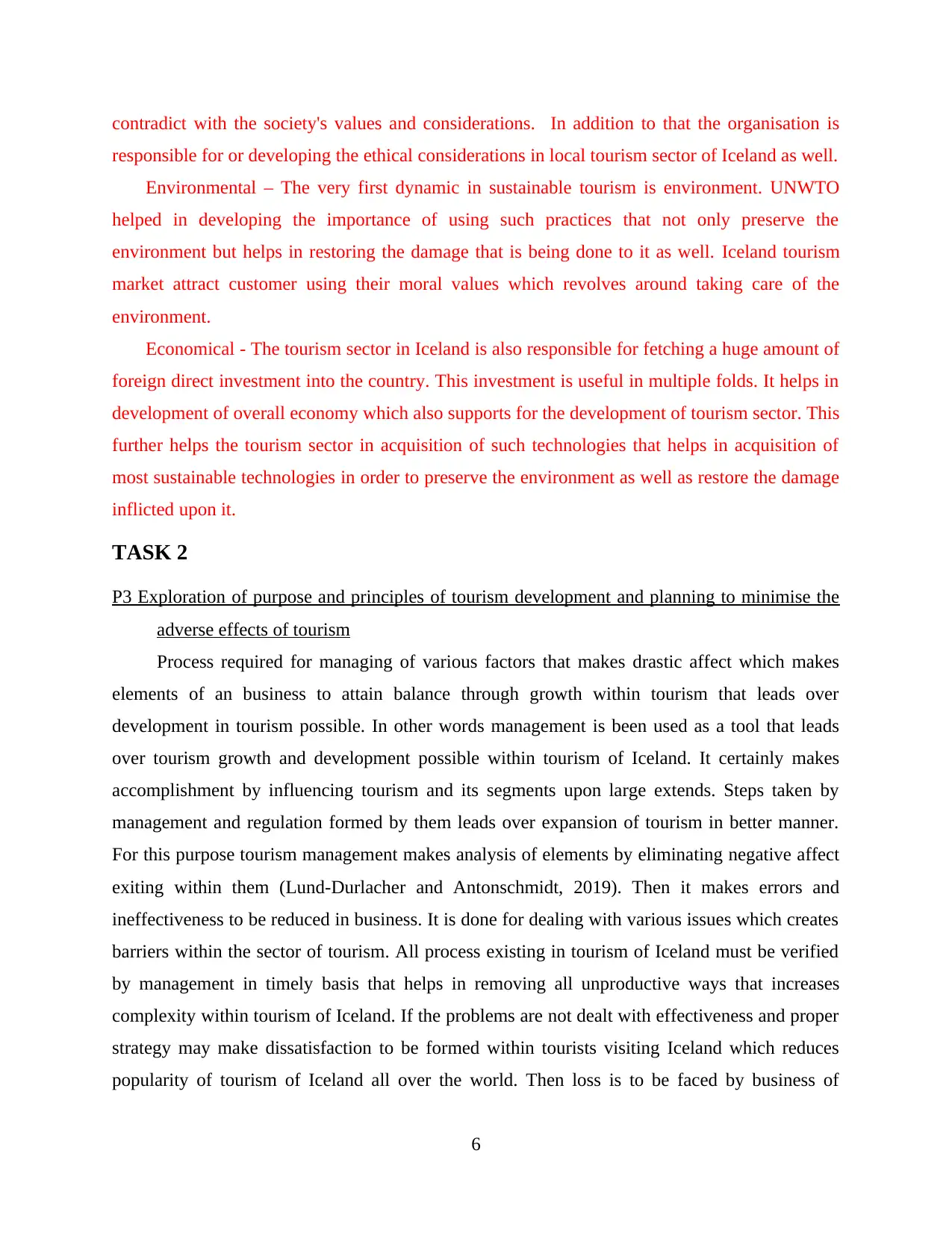
contradict with the society's values and considerations. In addition to that the organisation is
responsible for or developing the ethical considerations in local tourism sector of Iceland as well.
Environmental – The very first dynamic in sustainable tourism is environment. UNWTO
helped in developing the importance of using such practices that not only preserve the
environment but helps in restoring the damage that is being done to it as well. Iceland tourism
market attract customer using their moral values which revolves around taking care of the
environment.
Economical - The tourism sector in Iceland is also responsible for fetching a huge amount of
foreign direct investment into the country. This investment is useful in multiple folds. It helps in
development of overall economy which also supports for the development of tourism sector. This
further helps the tourism sector in acquisition of such technologies that helps in acquisition of
most sustainable technologies in order to preserve the environment as well as restore the damage
inflicted upon it.
TASK 2
P3 Exploration of purpose and principles of tourism development and planning to minimise the
adverse effects of tourism
Process required for managing of various factors that makes drastic affect which makes
elements of an business to attain balance through growth within tourism that leads over
development in tourism possible. In other words management is been used as a tool that leads
over tourism growth and development possible within tourism of Iceland. It certainly makes
accomplishment by influencing tourism and its segments upon large extends. Steps taken by
management and regulation formed by them leads over expansion of tourism in better manner.
For this purpose tourism management makes analysis of elements by eliminating negative affect
exiting within them (Lund-Durlacher and Antonschmidt, 2019). Then it makes errors and
ineffectiveness to be reduced in business. It is done for dealing with various issues which creates
barriers within the sector of tourism. All process existing in tourism of Iceland must be verified
by management in timely basis that helps in removing all unproductive ways that increases
complexity within tourism of Iceland. If the problems are not dealt with effectiveness and proper
strategy may make dissatisfaction to be formed within tourists visiting Iceland which reduces
popularity of tourism of Iceland all over the world. Then loss is to be faced by business of
6
responsible for or developing the ethical considerations in local tourism sector of Iceland as well.
Environmental – The very first dynamic in sustainable tourism is environment. UNWTO
helped in developing the importance of using such practices that not only preserve the
environment but helps in restoring the damage that is being done to it as well. Iceland tourism
market attract customer using their moral values which revolves around taking care of the
environment.
Economical - The tourism sector in Iceland is also responsible for fetching a huge amount of
foreign direct investment into the country. This investment is useful in multiple folds. It helps in
development of overall economy which also supports for the development of tourism sector. This
further helps the tourism sector in acquisition of such technologies that helps in acquisition of
most sustainable technologies in order to preserve the environment as well as restore the damage
inflicted upon it.
TASK 2
P3 Exploration of purpose and principles of tourism development and planning to minimise the
adverse effects of tourism
Process required for managing of various factors that makes drastic affect which makes
elements of an business to attain balance through growth within tourism that leads over
development in tourism possible. In other words management is been used as a tool that leads
over tourism growth and development possible within tourism of Iceland. It certainly makes
accomplishment by influencing tourism and its segments upon large extends. Steps taken by
management and regulation formed by them leads over expansion of tourism in better manner.
For this purpose tourism management makes analysis of elements by eliminating negative affect
exiting within them (Lund-Durlacher and Antonschmidt, 2019). Then it makes errors and
ineffectiveness to be reduced in business. It is done for dealing with various issues which creates
barriers within the sector of tourism. All process existing in tourism of Iceland must be verified
by management in timely basis that helps in removing all unproductive ways that increases
complexity within tourism of Iceland. If the problems are not dealt with effectiveness and proper
strategy may make dissatisfaction to be formed within tourists visiting Iceland which reduces
popularity of tourism of Iceland all over the world. Then loss is to be faced by business of
6
⊘ This is a preview!⊘
Do you want full access?
Subscribe today to unlock all pages.

Trusted by 1+ million students worldwide
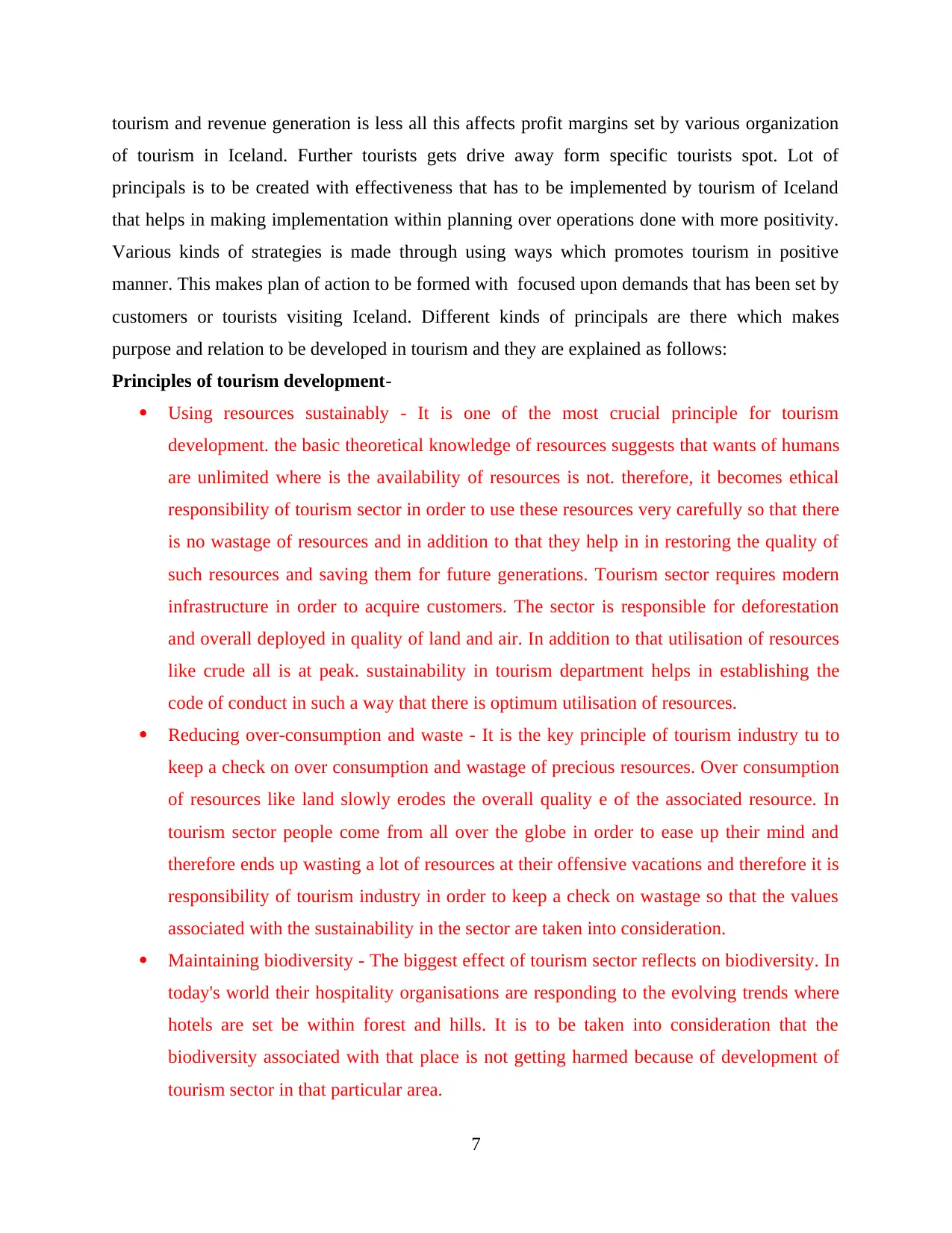
tourism and revenue generation is less all this affects profit margins set by various organization
of tourism in Iceland. Further tourists gets drive away form specific tourists spot. Lot of
principals is to be created with effectiveness that has to be implemented by tourism of Iceland
that helps in making implementation within planning over operations done with more positivity.
Various kinds of strategies is made through using ways which promotes tourism in positive
manner. This makes plan of action to be formed with focused upon demands that has been set by
customers or tourists visiting Iceland. Different kinds of principals are there which makes
purpose and relation to be developed in tourism and they are explained as follows:
Principles of tourism development-
Using resources sustainably - It is one of the most crucial principle for tourism
development. the basic theoretical knowledge of resources suggests that wants of humans
are unlimited where is the availability of resources is not. therefore, it becomes ethical
responsibility of tourism sector in order to use these resources very carefully so that there
is no wastage of resources and in addition to that they help in in restoring the quality of
such resources and saving them for future generations. Tourism sector requires modern
infrastructure in order to acquire customers. The sector is responsible for deforestation
and overall deployed in quality of land and air. In addition to that utilisation of resources
like crude all is at peak. sustainability in tourism department helps in establishing the
code of conduct in such a way that there is optimum utilisation of resources.
Reducing over-consumption and waste - It is the key principle of tourism industry tu to
keep a check on over consumption and wastage of precious resources. Over consumption
of resources like land slowly erodes the overall quality e of the associated resource. In
tourism sector people come from all over the globe in order to ease up their mind and
therefore ends up wasting a lot of resources at their offensive vacations and therefore it is
responsibility of tourism industry in order to keep a check on wastage so that the values
associated with the sustainability in the sector are taken into consideration.
Maintaining biodiversity - The biggest effect of tourism sector reflects on biodiversity. In
today's world their hospitality organisations are responding to the evolving trends where
hotels are set be within forest and hills. It is to be taken into consideration that the
biodiversity associated with that place is not getting harmed because of development of
tourism sector in that particular area.
7
of tourism in Iceland. Further tourists gets drive away form specific tourists spot. Lot of
principals is to be created with effectiveness that has to be implemented by tourism of Iceland
that helps in making implementation within planning over operations done with more positivity.
Various kinds of strategies is made through using ways which promotes tourism in positive
manner. This makes plan of action to be formed with focused upon demands that has been set by
customers or tourists visiting Iceland. Different kinds of principals are there which makes
purpose and relation to be developed in tourism and they are explained as follows:
Principles of tourism development-
Using resources sustainably - It is one of the most crucial principle for tourism
development. the basic theoretical knowledge of resources suggests that wants of humans
are unlimited where is the availability of resources is not. therefore, it becomes ethical
responsibility of tourism sector in order to use these resources very carefully so that there
is no wastage of resources and in addition to that they help in in restoring the quality of
such resources and saving them for future generations. Tourism sector requires modern
infrastructure in order to acquire customers. The sector is responsible for deforestation
and overall deployed in quality of land and air. In addition to that utilisation of resources
like crude all is at peak. sustainability in tourism department helps in establishing the
code of conduct in such a way that there is optimum utilisation of resources.
Reducing over-consumption and waste - It is the key principle of tourism industry tu to
keep a check on over consumption and wastage of precious resources. Over consumption
of resources like land slowly erodes the overall quality e of the associated resource. In
tourism sector people come from all over the globe in order to ease up their mind and
therefore ends up wasting a lot of resources at their offensive vacations and therefore it is
responsibility of tourism industry in order to keep a check on wastage so that the values
associated with the sustainability in the sector are taken into consideration.
Maintaining biodiversity - The biggest effect of tourism sector reflects on biodiversity. In
today's world their hospitality organisations are responding to the evolving trends where
hotels are set be within forest and hills. It is to be taken into consideration that the
biodiversity associated with that place is not getting harmed because of development of
tourism sector in that particular area.
7
Paraphrase This Document
Need a fresh take? Get an instant paraphrase of this document with our AI Paraphraser
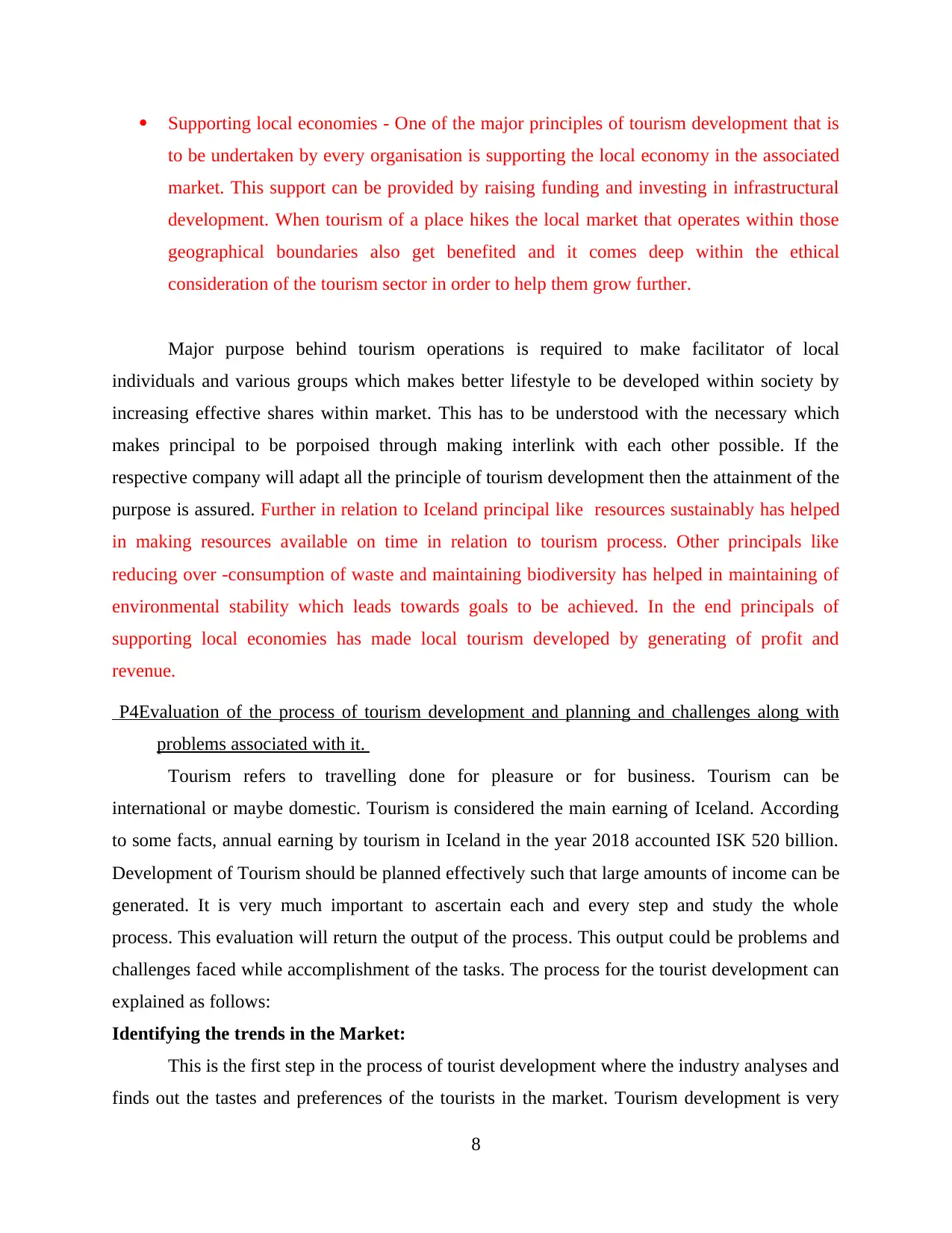
Supporting local economies - One of the major principles of tourism development that is
to be undertaken by every organisation is supporting the local economy in the associated
market. This support can be provided by raising funding and investing in infrastructural
development. When tourism of a place hikes the local market that operates within those
geographical boundaries also get benefited and it comes deep within the ethical
consideration of the tourism sector in order to help them grow further.
Major purpose behind tourism operations is required to make facilitator of local
individuals and various groups which makes better lifestyle to be developed within society by
increasing effective shares within market. This has to be understood with the necessary which
makes principal to be porpoised through making interlink with each other possible. If the
respective company will adapt all the principle of tourism development then the attainment of the
purpose is assured. Further in relation to Iceland principal like resources sustainably has helped
in making resources available on time in relation to tourism process. Other principals like
reducing over -consumption of waste and maintaining biodiversity has helped in maintaining of
environmental stability which leads towards goals to be achieved. In the end principals of
supporting local economies has made local tourism developed by generating of profit and
revenue.
P4Evaluation of the process of tourism development and planning and challenges along with
problems associated with it.
Tourism refers to travelling done for pleasure or for business. Tourism can be
international or maybe domestic. Tourism is considered the main earning of Iceland. According
to some facts, annual earning by tourism in Iceland in the year 2018 accounted ISK 520 billion.
Development of Tourism should be planned effectively such that large amounts of income can be
generated. It is very much important to ascertain each and every step and study the whole
process. This evaluation will return the output of the process. This output could be problems and
challenges faced while accomplishment of the tasks. The process for the tourist development can
explained as follows:
Identifying the trends in the Market:
This is the first step in the process of tourist development where the industry analyses and
finds out the tastes and preferences of the tourists in the market. Tourism development is very
8
to be undertaken by every organisation is supporting the local economy in the associated
market. This support can be provided by raising funding and investing in infrastructural
development. When tourism of a place hikes the local market that operates within those
geographical boundaries also get benefited and it comes deep within the ethical
consideration of the tourism sector in order to help them grow further.
Major purpose behind tourism operations is required to make facilitator of local
individuals and various groups which makes better lifestyle to be developed within society by
increasing effective shares within market. This has to be understood with the necessary which
makes principal to be porpoised through making interlink with each other possible. If the
respective company will adapt all the principle of tourism development then the attainment of the
purpose is assured. Further in relation to Iceland principal like resources sustainably has helped
in making resources available on time in relation to tourism process. Other principals like
reducing over -consumption of waste and maintaining biodiversity has helped in maintaining of
environmental stability which leads towards goals to be achieved. In the end principals of
supporting local economies has made local tourism developed by generating of profit and
revenue.
P4Evaluation of the process of tourism development and planning and challenges along with
problems associated with it.
Tourism refers to travelling done for pleasure or for business. Tourism can be
international or maybe domestic. Tourism is considered the main earning of Iceland. According
to some facts, annual earning by tourism in Iceland in the year 2018 accounted ISK 520 billion.
Development of Tourism should be planned effectively such that large amounts of income can be
generated. It is very much important to ascertain each and every step and study the whole
process. This evaluation will return the output of the process. This output could be problems and
challenges faced while accomplishment of the tasks. The process for the tourist development can
explained as follows:
Identifying the trends in the Market:
This is the first step in the process of tourist development where the industry analyses and
finds out the tastes and preferences of the tourists in the market. Tourism development is very
8
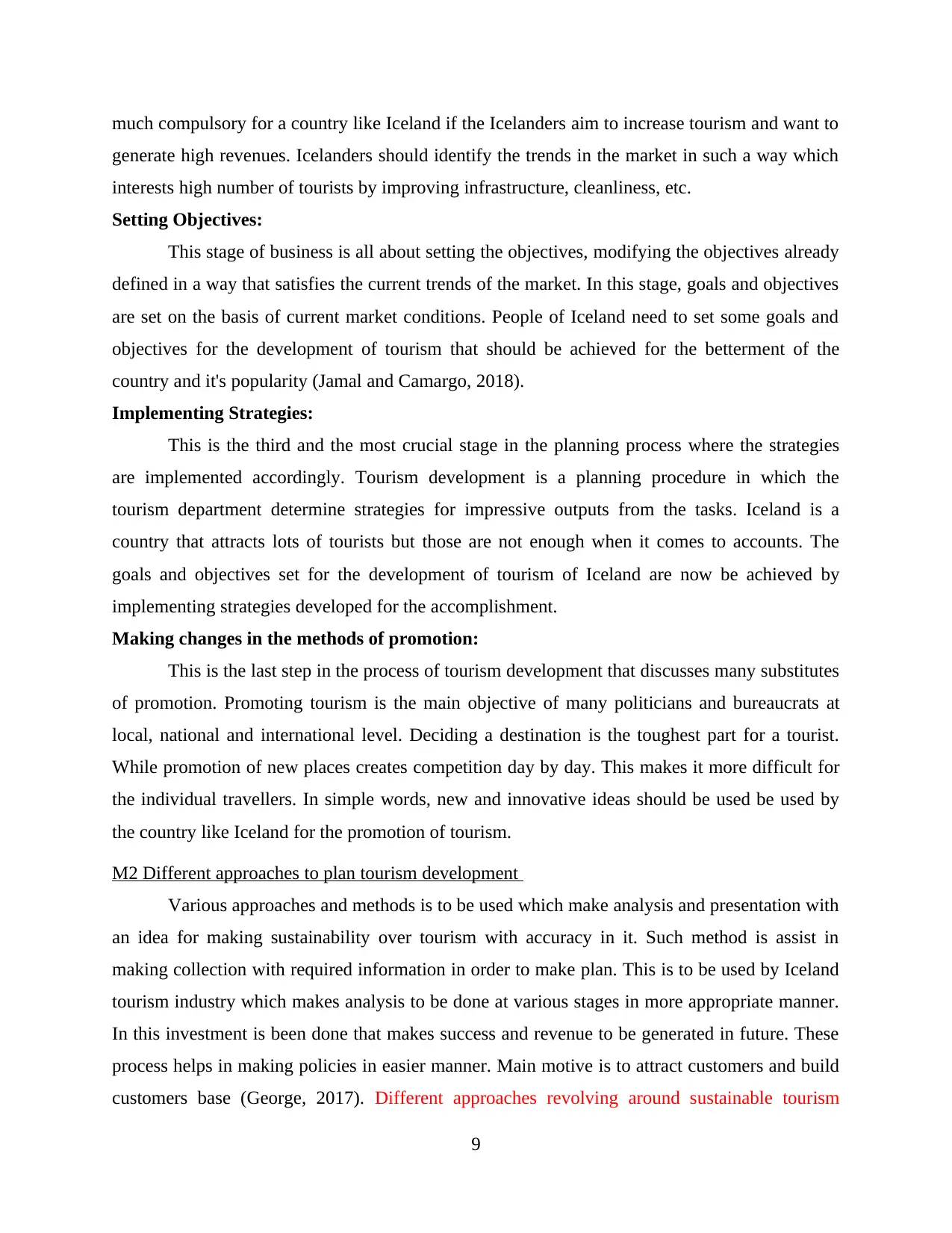
much compulsory for a country like Iceland if the Icelanders aim to increase tourism and want to
generate high revenues. Icelanders should identify the trends in the market in such a way which
interests high number of tourists by improving infrastructure, cleanliness, etc.
Setting Objectives:
This stage of business is all about setting the objectives, modifying the objectives already
defined in a way that satisfies the current trends of the market. In this stage, goals and objectives
are set on the basis of current market conditions. People of Iceland need to set some goals and
objectives for the development of tourism that should be achieved for the betterment of the
country and it's popularity (Jamal and Camargo, 2018).
Implementing Strategies:
This is the third and the most crucial stage in the planning process where the strategies
are implemented accordingly. Tourism development is a planning procedure in which the
tourism department determine strategies for impressive outputs from the tasks. Iceland is a
country that attracts lots of tourists but those are not enough when it comes to accounts. The
goals and objectives set for the development of tourism of Iceland are now be achieved by
implementing strategies developed for the accomplishment.
Making changes in the methods of promotion:
This is the last step in the process of tourism development that discusses many substitutes
of promotion. Promoting tourism is the main objective of many politicians and bureaucrats at
local, national and international level. Deciding a destination is the toughest part for a tourist.
While promotion of new places creates competition day by day. This makes it more difficult for
the individual travellers. In simple words, new and innovative ideas should be used be used by
the country like Iceland for the promotion of tourism.
M2 Different approaches to plan tourism development
Various approaches and methods is to be used which make analysis and presentation with
an idea for making sustainability over tourism with accuracy in it. Such method is assist in
making collection with required information in order to make plan. This is to be used by Iceland
tourism industry which makes analysis to be done at various stages in more appropriate manner.
In this investment is been done that makes success and revenue to be generated in future. These
process helps in making policies in easier manner. Main motive is to attract customers and build
customers base (George, 2017). Different approaches revolving around sustainable tourism
9
generate high revenues. Icelanders should identify the trends in the market in such a way which
interests high number of tourists by improving infrastructure, cleanliness, etc.
Setting Objectives:
This stage of business is all about setting the objectives, modifying the objectives already
defined in a way that satisfies the current trends of the market. In this stage, goals and objectives
are set on the basis of current market conditions. People of Iceland need to set some goals and
objectives for the development of tourism that should be achieved for the betterment of the
country and it's popularity (Jamal and Camargo, 2018).
Implementing Strategies:
This is the third and the most crucial stage in the planning process where the strategies
are implemented accordingly. Tourism development is a planning procedure in which the
tourism department determine strategies for impressive outputs from the tasks. Iceland is a
country that attracts lots of tourists but those are not enough when it comes to accounts. The
goals and objectives set for the development of tourism of Iceland are now be achieved by
implementing strategies developed for the accomplishment.
Making changes in the methods of promotion:
This is the last step in the process of tourism development that discusses many substitutes
of promotion. Promoting tourism is the main objective of many politicians and bureaucrats at
local, national and international level. Deciding a destination is the toughest part for a tourist.
While promotion of new places creates competition day by day. This makes it more difficult for
the individual travellers. In simple words, new and innovative ideas should be used be used by
the country like Iceland for the promotion of tourism.
M2 Different approaches to plan tourism development
Various approaches and methods is to be used which make analysis and presentation with
an idea for making sustainability over tourism with accuracy in it. Such method is assist in
making collection with required information in order to make plan. This is to be used by Iceland
tourism industry which makes analysis to be done at various stages in more appropriate manner.
In this investment is been done that makes success and revenue to be generated in future. These
process helps in making policies in easier manner. Main motive is to attract customers and build
customers base (George, 2017). Different approaches revolving around sustainable tourism
9
⊘ This is a preview!⊘
Do you want full access?
Subscribe today to unlock all pages.

Trusted by 1+ million students worldwide
1 out of 22
Related Documents
Your All-in-One AI-Powered Toolkit for Academic Success.
+13062052269
info@desklib.com
Available 24*7 on WhatsApp / Email
![[object Object]](/_next/static/media/star-bottom.7253800d.svg)
Unlock your academic potential
Copyright © 2020–2026 A2Z Services. All Rights Reserved. Developed and managed by ZUCOL.





